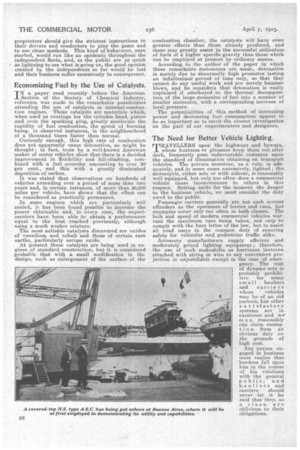Economizing Fuel by the Use of Catalysts.
Page 2

If you've noticed an error in this article please click here to report it so we can fix it.
IN a paper read recently before the American Section of the Society of Chemical Industry, reference was made to the remarkable possibilities attending s the use of catalysts in internal-combustion engines. These catalysts are materials which, when used as coatings for the cylinder head, piston and even the sparking plug, greatly accelerate the rapidity of fuel combustion, the speed of burning being, in observed instances, in the neighbourhood of a thousand times faster than normal. Curiously enough, this high rate of combustion does not apparently cause detonation, as might be thought ; in fact, tests by a well-known American maker of motor vehicles show that there is a decided improvement in flexibility and hill-climbing, combined with a fuel economy amounting to over 20 per cent., and this with a greatly diminished deposition of carbon.
It was stated that observations on hundreds of vehicles extending over a period of more than two years and, in certain instances, of more than 20,000 miles per vehicle, have shown that the effect can be considered as practically permanent.
In some engines which are particularly well cooled, it has been found possible to increase the power obtainable and, in every case, the experimenters have been able to obtain a performance equal to the best reached previously, although using a much weaker mixture.
The most suitable catalysts discovered are oxides of vanadium and cobalt and those of certain rare earths, particularly cerium oxide.
At present these catalysts are being used irr engines of standard construction, but it is considered probable that with a small modification in the design, such as enlargement of the surface of the combustion chamber, the catalysts will have even greater effects than those already produced, and these may greatly assist in the successful utilization of fuels of a higher specific gravity than those which can be employed at present by ordinary means. According to the author of the paper in which these remarkable statements are made, detonation is mainly due to abnormally high pressures lasting an infinitesimal period of time only, so that they cannot do any useful work and are merely hammer blows, and he considers that detonation is easily explained if attributed to the thermal decomposition of the large molecules of fuel into a number of smaller molecules, with a corresponding increase of local pressure. The potentialities of thia method of increasing power and decreasing fuel consumption appear to be so important as to merit the closest investigation on the part of our experimenters and designers.




























